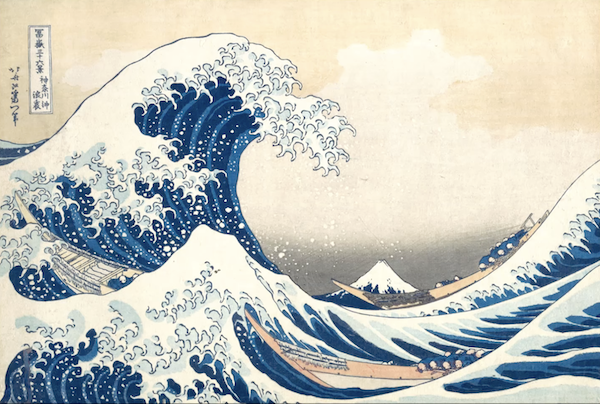
The Great Wave off Kanagawa is a woodblock print by Japanese ukiyo-e artist Hokusai, created in late 1831 during the Edo period of Japanese history. Aka, The Great Wave or The Wave, the print depicts three boats moving through a storm-tossed sea, with a large, cresting wave forming a spiral in the centre and Mount Fuji visible in the background. The print is Hokusai’s best-known work and the first in his series Thirty-six Views of Mount Fuji, in which the use of Prussian blue revolutionized Japanese prints. The two other famous prints in that series are Fine Wind, Clear Morning, aka, Red Fuji, and Thunderstorm Beneath the Summit.
The Great Wave off Kanagawa has been described as possibly the most reproduced image in the history of all art, as well as being a contender for the most famous artwork in Japanese history. This woodblock print has influenced several Western artists and musicians, including Claude Debussy, Vincent van Gogh and Claude Monet.
Roger Start Keyes, art historian, Hokusai scholar, and co-founder of York Zen, wrote his poem “Hokusai Says,” featured on the York Zen Welcome Page, in Venice in 1990. It appeared suddenly as he was making notes for the “Young Hokusai” paper he was to give at a symposium on Hokusai the following day.
Hokusai Says – Poem by Roger Keyes
Hokusai says look carefully.
He says pay attention, notice.
He says keep looking, stay curious.
He says there is no end to seeing.
He says look forward to getting old.
He says keep changing,
you just get more who you really are.
He says get stuck, accept it,
repeat yourself as long as it’s interesting.
He says keep doing what you love.
He says keep praying.
He says every one of us is a child,
every one of us is ancient,
every one of us has a body.
He says every one of us is frightened.
He says every one of us has to find a way to live with fear.
He says everything is alive –
shells, buildings, people, fish, mountains, trees.
Wood is alive.
Water is alive.
Everything has its own life.
Everything lives inside us.
He says live with the world inside you.
He says it doesn’t matter if you draw, or write books.
It doesn’t matter if you saw wood, or catch fish.
It doesn’t matter if you sit at home and stare at the ants on your veranda
or the shadows of the trees and grasses in your garden.
It matters that you care.
It matters that you feel.
It matters that you notice.
It matters that life lives through you.
Contentment is life living through you.
Joy is life living through you.
Satisfaction and strength is life living through you.
Peace is life living through you.
He says don’t be afraid.
Don’t be afraid.
Look, feel, let life take you by the hand.
Let life live through you.
Enjoy this presentation by curator, gallerist, and passionate art lover, James Payne, for his series, Great Art Explained: The Great Wave by Hokusai. You can see more of the artist’s work in these two presentations posted by The British Museum: Curator’s Tour of Hokusai: The Great Picture Book of Everything and Hokusai’s Unpublished Illustrations (Curator’s Corner S6 Ep8).
Hokusai’s instructions, received, written and recited by Roger Keyes, about paying attention, noticing things, and living life fully, remind me of Mary Oliver‘s lessons on attention, receptivity, listening, delighting in and writing, expressed in many of her poems, like Mindful and Praying.
— Written and compiled (citing sources) by Ken Chawkin for The Uncarved Blog.





